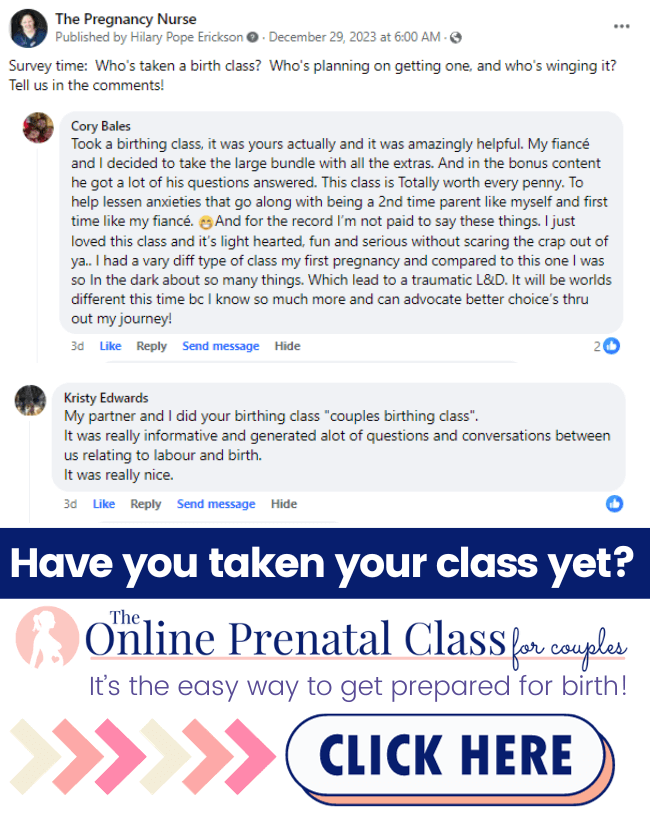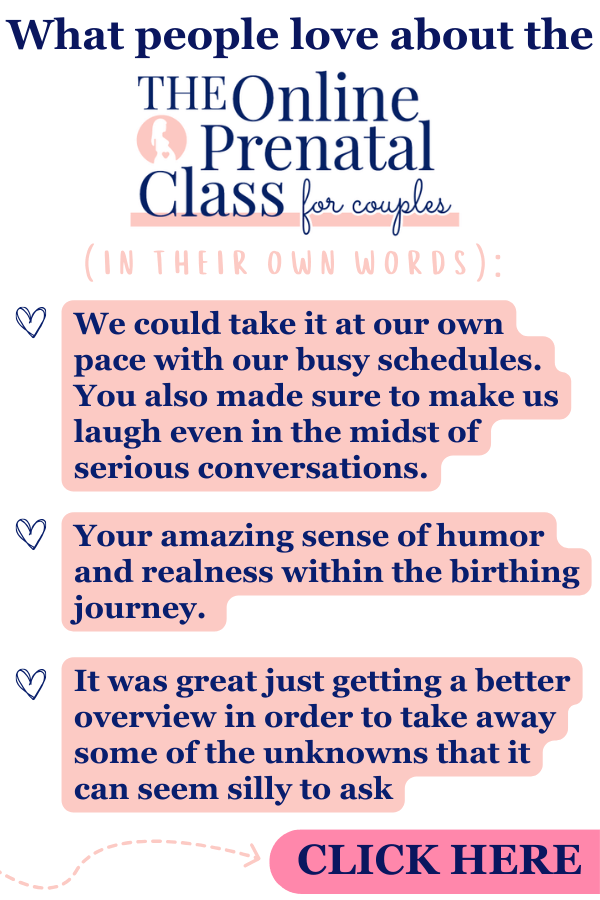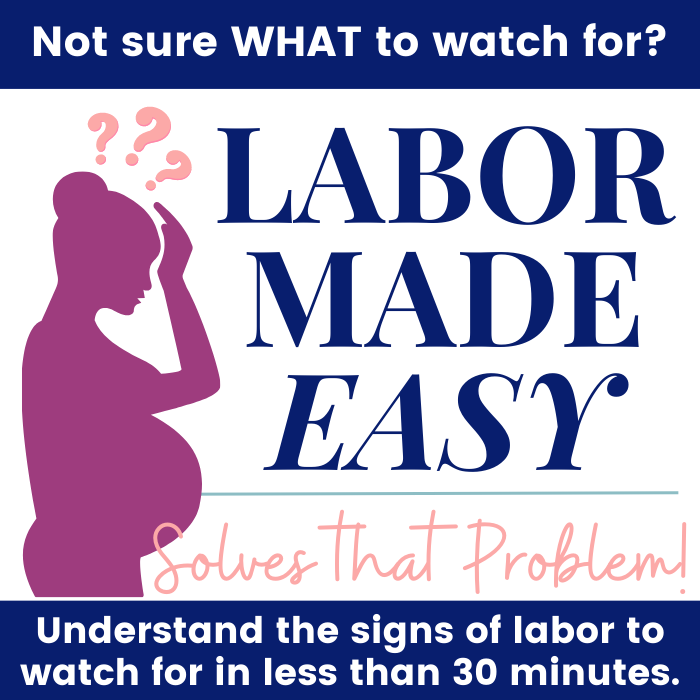📣 YOU are clearly getting prepared for pregnancy, birth & beyond — but do you wish your partner was more involved (looking for a teammate rather than just a cheerleader)? Couples love THIS! 💛🧡💚
Are you headed towards you due date and feeling a TON of fatigue as you go about your day. Your body is almost at its brink as it is trying to keep humans alive in that third trimester. So, what can you do?

39 Weeks Pregnant and Feeling Very Tired and Sleepy — What’s Wrong?
Nothing, that is so normal. You may have to let certain areas of your life “slide” as you are forming a full-fledged human inside your own. But, it can be a sign of labor!
So, let’s keep chatting about WHY you might be so tired (and what you can do)
But first, how do I know so much about being tired during those last few weeks?
Hi — I’m Hilary — The Pregnancy Nurse 👩⚕️. I have been a nurse since 1997 and I have 20 years of OB nursing experience, I am also the curly head behind Pulling Curls and The Online Prenatal Class for Couples. 🩺 Besides being SO tired with my last pregnancies, I have talked to thousands of of pregnant moms who are suffering in those final weeks. I have some good ideas for you about what causes it and what you can do about it.
BUT, there’s no better way to spend your couch time right now than to take a prenatal class. You may think it’s too late, but The Online Prenatal Class for Couples can be done in just a few hours — so grab it and get started! It may help you sleep better at night too!
Is Sleeping a Lot a Sign of Labor?
Sleeping a lot can be a sign of labor in the last few weeks of pregnancy. During the third trimester, many women experience extreme fatigue due to the high levels of hormones preparing the body for giving birth. It is important to rest as much as possible during this time in order to prepare for labor and delivery.
Although it is normal to feel more fatigued during the last weeks of pregnancy, sleeping a lot can be an indication that labor may happen soon. If you are feeling unusually tired or if your sleeping pattern has suddenly changed, it could be a sign that your body is getting ready to give birth. It is important to speak with your doctor if you are having any unusual symptoms related to labor, such as excessive sleepiness or fatigue.

How Can I Tell Pre-Labor Fatigue Apart from Third Trimester Fatigue?
Fatigue is common during the third trimester, but pre-labor fatigue is a bit different. Pre-labor fatigue will be more extreme than what you typically experience during your third trimester. It can feel like you need a nap more than anything else, and it can come on suddenly.
This type of fatigue may happen around the time labor is about to start and can be one of the early signs of labor. To tell pre-labor fatigue apart from third trimester fatigue, pay attention to how extreme your fatigue is and how quickly it comes on. If it feels like you are suddenly exhausted… there are a few things it could be:
- You’re over-doing it, you just can’t do as much as you did before without feeling really tired.
- It could mean that labor is close. You can get a big wave of fatigue that comes over you before labor is to start, but honestly, it’s hard to tell from regular life fatigue at 39 weeks!
- You’re growing a human — seriously, if you think about all the things you’re oxygenating, carrying around and growing — it’s a wonder you can even get up and put clothes on. Good job!
Pro Tip: Most often this type of pre-labor fatigue can really only be seen in hindsight. Once you’re in full-blown labor, you’ll think back and say “Oh, THAT’s what that was….”
What causes pregnancy fatigue?
Pregnancy fatigue is a a very common complaint from pregnant people, with many women feeling excessively tired and fatigued throughout much of their pregnancy.
Generally speaking, pregnancy fatigue is caused by a combination of factors, including hormonal changes, an increase in blood volume and production of the hormone progesterone. These hormonal changes can cause an increase in fatigue as the body works to support the growing fetus, resulting in increased tiredness.
Furthermore, stress and anxiety related to preparing for childbirth may also contribute to pregnancy fatigue.
Finally, some pregnant women may experience sleep disturbances due to frequent urination or difficulty getting comfortable due to the size of their growing baby bump.
While there is no single cure for pregnancy fatigue, taking regular naps during the day and getting adequate rest at night, and possibly eliminating any serious stressors in your life (if possible) can help expecting mothers get through it. Eating a balanced diet, staying well-hydrated and exercising regularly can also help reduce feelings of exhaustion.
Sometimes the stress of what happens at delivery weighs on you, you can’t sleep or it’s nagging you at the back of your mind. Taking a prenatal class can help this a lot, studies show it decreases anxiety!
Can fatigue hurt my baby?
Short-term fatigue is not usually an issue, but there are things that it can cause.
It can cause you to just not take care of yourself as well. No walks outside to get some sun, yoga may be more than you can do, or even eating fruits and veggies…. You’d rather have a ho-ho and sit on the couch. 🙂
Constant fatigue can be an issue, and may be a sign of a bigger problem (like not enough iron — being anemic). If you’re constantly feeling that way you may walk to talk to your doctor about it.
Is it Normal to Feel Tired Before Labor?
It is perfectly normal to feel tired before labor. During the weeks of pregnancy leading up to your due date, you may experience a feeling of tiredness that is a result of your body preparing for labor.
This fatigue CAN be a sign of labor, but there are other signs to watch out for as well. For example, real contractions that do not go away, or GI upset (nausea, vomiting or diarrhea) can all be signs of labor. If you feel these symptoms alongside fatigue and tiredness, it could be an indication that labor is on its way. If you’re JUST looking for info on the signs of labor check out Labor Made Easy where I help make the signs of labor easy to understand.
Think about it though, it makes sense that mother nature would encourage you to get a LOT of rest before you do something as strenuous as labor!
What should I do if I feel tired at the end of my pregnancy?
First off, remember it’s very normal. No reason to put extra pressure on yourself due to something that’s so normal.
Secondly, move tasks that aren’t required to someone else. Your main job is growing that baby. Getting up, putting clothes on, eating and staying hydrated. Those are tiring when you’re pulling in enough oxygen, and circulating enough blood for two humans.
Third, take your time to rest. It’s a great time to review (or take) your prenatal class materials. Time to dream, stay hydrated and enjoy the fact that babies are easier on the inside than out (for the most part) You’re doing a great job as you’re helping them have the best chance in life allowing them to grow and exit on their own timeframe.
Resting time is also a GREAT time to do kick counts!
Fourth, promote great sleep at night. That means good sleep hygiene like not using screens before bed, keeping them out of your room, using white noise and making sure you have comfortable pillows.
Fifth, you can always check with your doctor to make sure things are progressing well for you. You may even want to have your cervix and baby’s position checked. Even though it doesn’t tell the whole story, it can give you an idea of what your future holds.
But, your future definitely holds getting that baby OUT so, come join me in the prenatal class that was created for busy couples, and get prepared in just a few hours!
Or, if you’re just looking for the signs of labor, grab Labor Made Easy!
Don’t miss my super helpful post all about the signs of labor. Great info for pregnancy!







 What Does it Mean When One Pregnancy Test is Positive and the Other is Negative?
What Does it Mean When One Pregnancy Test is Positive and the Other is Negative?
